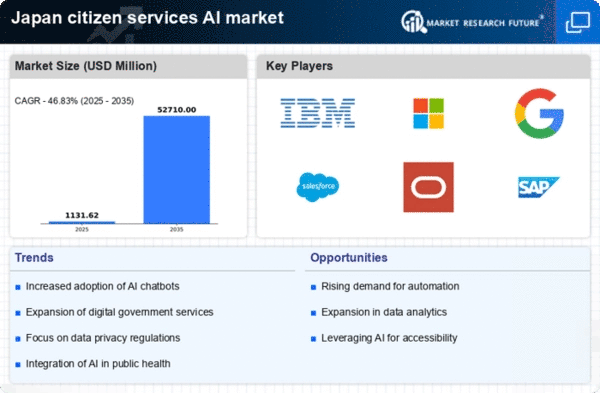Technological Advancements in AI
The rapid evolution of artificial intelligence technologies is a primary driver for the citizen services-ai market. In Japan, advancements in natural language processing and machine learning algorithms enhance the capabilities of AI systems, enabling them to provide more accurate and efficient services. This technological progress is reflected in the increasing investment in AI research and development, which reached approximately $1.5 billion in 2025. As a result, public sector organizations are more inclined to adopt AI solutions to improve service delivery and citizen engagement. The citizen services-ai market is likely to benefit from these innovations, as they facilitate the creation of more sophisticated applications that can address the diverse needs of the population.
Government Initiatives and Policies
The Japanese government actively promotes the integration of AI in public services, which significantly influences the citizen services-ai market. Initiatives such as the 'AI Strategy 2025' aim to enhance the efficiency and effectiveness of government operations through AI technologies. This strategic framework encourages collaboration between public and private sectors, fostering innovation and investment in AI solutions. As a result, funding for AI projects in public services is projected to increase by 20% annually, creating a conducive environment for the growth of the citizen services-ai market. These government policies not only support technological adoption but also aim to improve overall citizen satisfaction with public services.
Aging Population and Workforce Challenges
Japan's demographic trends, particularly its aging population, present unique challenges that impact the citizen services-ai market. With approximately 28% of the population aged 65 and older, there is an increasing need for efficient public services that cater to the elderly. AI technologies can play a crucial role in addressing these challenges by automating routine tasks and providing support for healthcare services. The government is expected to allocate an additional $500 million towards AI solutions aimed at improving services for the elderly by 2026. This focus on addressing demographic shifts is likely to drive growth in the citizen services-ai market as organizations seek innovative ways to support an aging society.
Increased Focus on Data Privacy and Ethics
As the citizen services-ai market expands, there is a heightened awareness of data privacy and ethical considerations surrounding AI technologies. In Japan, public trust in AI systems is paramount, and government agencies are implementing strict regulations to ensure data protection. The introduction of the Personal Information Protection Act has set a framework for how data is managed, influencing the development of AI solutions. Organizations are now prioritizing transparency and ethical AI practices, which could lead to a more responsible approach to technology deployment. This focus on data privacy is likely to shape the citizen services-ai market, as agencies strive to build trust and ensure compliance with evolving regulations.
Rising Demand for Enhanced Citizen Engagement
There is a growing expectation among citizens for more interactive and responsive public services, which drives the citizen services-ai market. In Japan, citizens increasingly seek personalized experiences and timely responses from government agencies. This demand is reflected in surveys indicating that over 70% of citizens prefer digital interactions for service inquiries. Consequently, public sector organizations are investing in AI-driven solutions, such as chatbots and virtual assistants, to meet these expectations. The citizen services-ai market is likely to expand as agencies strive to enhance engagement and streamline communication with the public, ultimately leading to improved service delivery.

















